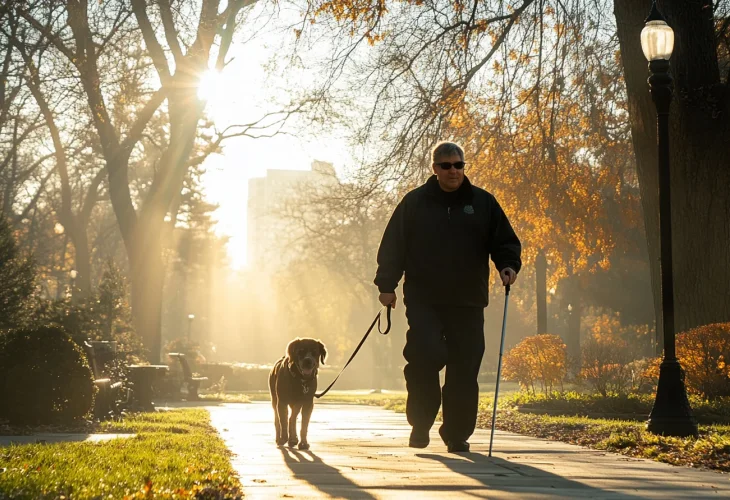Personal Stories
The Doctor Said There Was No Hope — But 16 Years Later, a Miracle Happened
From that moment on, Coplin felt life had lost all meaning — how could he go on without the ability to see?

Kevin Coplin was wrapping up a long day at the office. As a senior economist, his work was fast-paced and stressful. He constantly monitored the markets, issued urgent instructions to buy or sell, consulted on million-dollar deals — and millions flowed with each tap of his keyboard. The last task of the day was simple: review a market report. But as he stared at the document, something was wrong. The letters were blurry. Maybe he was just tired? Or coming down with something?
The next morning, after a good night's sleep, Kevin brewed his strong coffee, grabbed his beloved New York Times, and settled in. But again — the letters danced and blurred. It didn’t make sense. Glasses at 36? He brushed off the thought but decided to pop into an ophthalmologist anyway, assuming it would be a quick visit and maybe a new pair of stylish gold frames.
Instead, the doctor dropped a bombshell:
"Mr. Coplin, this isn’t nearsightedness. Your vision is deteriorating rapidly. You need to be hospitalized for tests — immediately."
Test after test ruled out tumors and other dangers. Finally, they found the cause: a hereditary condition called Leber’s disease.
Kevin, shocked, asked, "How do we treat this?"
The answer crushed him: "There’s no treatment. In a few weeks, you will be completely blind."
Darkness fell — not just physically, but emotionally.
One of Kevin’s last memories with sight was glancing at the doctor’s calendar: February 20, 1997. After that, nothing was the same.
His love for art, design, photography, architecture — all lost meaning. How could he live without seeing?
In his memoir Unblinded (2018), Kevin shared:
"I was the typical crazy New Yorker, running from place to place, always rushing, always needing to be seen. I was so focused on myself I barely noticed anyone around me — especially people with disabilities. I simply looked the other way."
But now he had joined their world — a world he had once ignored.
How would he cope?
Before losing his sight, Kevin often drank to deal with the pressure. After blindness, his drinking worsened. Alcohol became his escape.
One day, at rock bottom, filled with grief and vodka, Kevin stumbled around his apartment, feeling for the expensive art he had once loved.
"What’s the point of all this if I can’t see it?" he cried.
In a fit of anger, he smashed his beloved artworks, tore down pictures, destroyed everything.
He had reached the lowest point a person could reach.
But it was exactly there — in that deep darkness — that something shifted.
He remembered a moment from his old life: seeing a blind man selling pencils outside a department store. Back then, Kevin had pitied him.
Now he thought differently:
"He’s a hero. He gets up every day and earns a living. I’m the one hiding, refusing to face reality."
That spark of realization lit the way to a slow, painful climb out of the darkness.
Kevin noticed he was hiding vodka bottles from himself. Why, if he couldn’t even see?
Because deep down, he knew — this wasn’t the life he wanted.
Slowly, Kevin found faith.
He started to feel God's presence with him — even in the small, quiet moments.
He realized that even this hardship was from the Creator’s hand.
He joined groups of blind individuals who laughed, learned, and supported one another.
He learned new ways to live — shopping, cooking, caring for himself.
He started to pray — first silently, then out loud — and not just for himself, but for others too.
And then, the unthinkable happened.
On August 14, 2013, Kevin got up as usual and made his way toward the bathroom — a path he knew by heart.
Suddenly, he noticed... light.
He thought it was a dream and brushed it off.
But the next day, he saw light again. Then, a faint picture on the wall.
Day by day, more shapes, more sights returned.
He saw his guide dog. He saw the world around him.
Over time, his vision kept improving — until it reached 70%.
His doctor, amazed, admitted she had never seen anyone with Leber’s disease recover like this.
What brought about the miracle?
Kevin believes it was faith, acceptance, letting go of anger, detoxifying his body, and filling his soul with gratitude and light.
His story reminds us:
No matter how hopeless things seem, no matter how final the doctor’s words sound — the Healer of all flesh is always with us.
Miracles happen every day.

